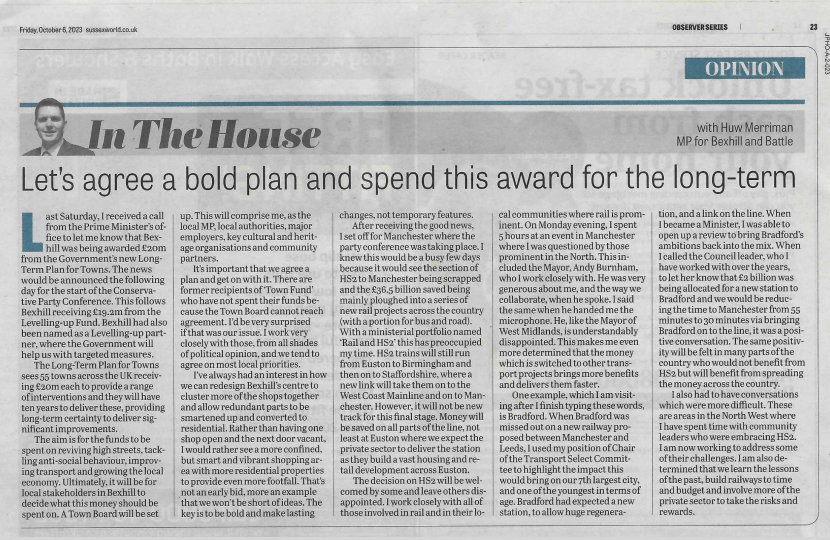
Last Saturday, I received a call from the Prime Minister’s office to let me know that Bexhill was being awarded £20m from the Government’s new Long-Term Plan for Towns. The news would be announced the following day for the start of the Conservative Party Conference. This follows Bexhill receiving £19.2m from the Levelling-up Fund. Bexhill had also been named as a Levelling-up partner, where the Government will help us with targeted measures.
The Long-Term Plan for Towns sees 55 towns across the UK receiving £20m each to provide a range of interventions and they will have ten years to deliver these, providing long-term certainty to deliver significant improvements.
The aim is for the funds to be spent on reviving high streets, tackling anti-social behaviour, improving transport and growing the local economy. Ultimately, it will be for local stakeholders in Bexhill to decide what this money should be spent on. A Town Board will be set up. This will comprise me, as the local MP, local authorities, major employers, key cultural and heritage organisations and community partners.
It’s important that we agree a plan and get on with it. There are former recipients of ‘Town Fund’ who have not spent their funds because the Town Board cannot reach agreement. I’d be very surprised if that was our issue. I work very closely with those, from all shades of political opinion, and we tend to agree on most local priorities.
I’ve always had an interest in how we can redesign Bexhill’s centre to cluster more of the shops together and allow redundant parts to be smartened up and coverted to residential. Rather than having one shop open and the next door vacant, I would rather see a more confined, but smart and vibrant shopping area with more residential properties to provide even more footfall. That’s not an early bid, more an example that we won’t be short of ideas. The key is to be bold and make lasting changes, not temporary features.
After receiving the good news, I set off for Manchester where the party conference was taking place. I knew this would be a busy few days because it would see the section of HS2 to Manchester being scrapped and the £36.5 billion saved being mainly ploughed into a series of new rail projects across the country (with a portion for bus and road). With a ministerial portfolio named ‘Rail and HS2’ this has preoccupied my time. HS2 trains will still run from Euston to Birmingham and then on to Staffordshire, where a new link will take them on to the West Coast Mainline and on to Manchester. However, it will not be new track for this final stage. Money will be saved on all parts of the line, not least at Euston where we expect the private sector to deliver the station as they build a vast housing and retail development across Euston.
The decision on HS2 will be welcomed by some and leave others disappointed. I work closely with all of those involved in rail and in their local communities where rail is prominent. On Monday evening, I spent 5 hours at an event in Manchester where I was questioned by those prominent in the North. This included the Mayor, Andy Burnham, who I work closely with. He was very generous about me, and the way we collaborate, when he spoke. I said the same when he handed me the microphone. He, like the Mayor of West Midlands, is understandably disappointed. This makes me even more determined that the money which is switched to other transport projects brings more benefits and delivers them faster.
One example, which I am visiting after I finish typing these words, is Bradford. When Bradford was missed out on a new railway proposed between Manchester and Leeds, I used my position of Chair of the Transport Select Committee to highlight the impact this would bring on our 7th largest city, and one of the youngest in terms of age. Bradford had expected a new station, to allow huge regeneration, and a link on the line. When I became a Minister, I was able to open up a review to bring Bradford’s ambitions back into the mix. When I called the Council leader, who I have worked with over the years, to let her know that £2 billion was being allocated for a new station to Bradford and we would be reducing the time to Manchester from 55 minutes to 30 minutes via bringing Bradford on to the line, it was a positive conversation. The same positivity will be felt in many parts of the country who would not benefit from HS2 but will benefit from spreading the money across the country.
I also had to have conversations which were more difficult. These are areas in the North West where I have spent time with community leaders who were embracing HS2. I am now working to address some of their challenges. I am also determined that we learn the lessons of the past, build railways to time and budget and involve more of the private sector to take the risks and rewards.



